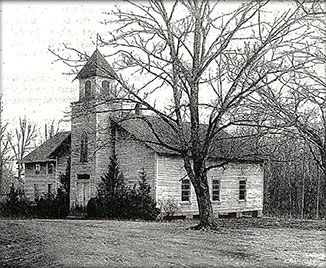
Becks Reformed Church is one of the oldest German Reformed Churches in Davidson County. Its rich history dates back to the pre-American Revolutionary War years. While November 5, 1787 is recognized as the official beginning of Becks Church, early deeds and various records indicate that Becks Church probably began around 1770. The November 5th date is the date the original 53-acre site was recorded in the name of Becks Church. Records indicate that “a church building and burial grounds” were already in existence prior to the November 5 date. Prior to the official date, other records indicate that various members of Becks Church (Reformed and Lutheran) held title to the church property. During the early years, Becks Church served the Reformed and Lutheran denominations in the area and was known as a “Union Church”.
The first formal house of worship serving the Becks congregations was probably a log structure built prior to 1787 under the leadership of Rev. Samuel Suther. In this log church, the Reformed and Lutherans worshipped together until 1878. At this time, the Lutherans withdrew from this “union”, building their own church and the Reformed Congregation built the above wooden structure. In 1924, under the pastorate of Rev. A.S. Peeler, the church was greatly enlarged with the addition of a Sunday School wing on the left of the main church building. This structure served the Becks Reformed Congregation until the present building was dedicated May 13, 1951.
Becks Reformed Church has been the corner stone of the Becks Church community for two hundred twenty-nine plus years. During this time, Becks Church has been affiliated with three denominations and presently operates as an independent, non-affiliated church. From the official beginning on November 5, 1787, Becks Church was affiliated with the German Reformed Church until 1934. In 1934, the German Reformed Church and the Evangelical Church of America merged, forming the Evangelical and Reformed Church. Becks Church became affiliated with the new denomination as Becks Evangelical and Reformed Church.
In 1961, the Evangelical and Reformed Church merged with the Congregational and Christian Church, forming the United Church of Christ. Once again, Becks Church became a member of a new denomination and remained in the United Church of Christ until August 27, 2006.
Due to theological differences between Becks Church and the United Church of Christ leadership, on August 27, 2006, the congregation of Becks Church voted overwhelmingly to sever ties with the United Church of Christ. On this date, Becks Church returned to its roots and once again became known as Becks Reformed Church. While returning to the traditions and beliefs of the historic German Reformed Church, Becks Church stands as an independent, unaffiliated congregation.
While we cannot live in the past, history does record the very foundation of Becks Reformed Church, where we came from, who we are and documents how people of humble means left the religious persecution of their war-torn German homeland and braved the hardships of a new world. Here they were free to worship without fear of persecution and formed a thriving, strong community. A community that had as its cornerstone, a strong belief in Christian values and morality and was built around the community church – Becks Reformed Church. The foundation of their church was rooted in the Apostolic traditions of the German Reformed Church. A church in which the Bible is affirmed as the inerrant, inspired Word of God and Jesus is heralded as Lord and Savior. It is upon this strong spiritual foundation that Becks Reformed Church must continue to grow and follow Jesus’ command to spread the Gospel. Becks Reformed Church stands strongly rooted in the Christian values and traditions of her founders while growing to the future – realizing what Jesus expected His Church to be.
